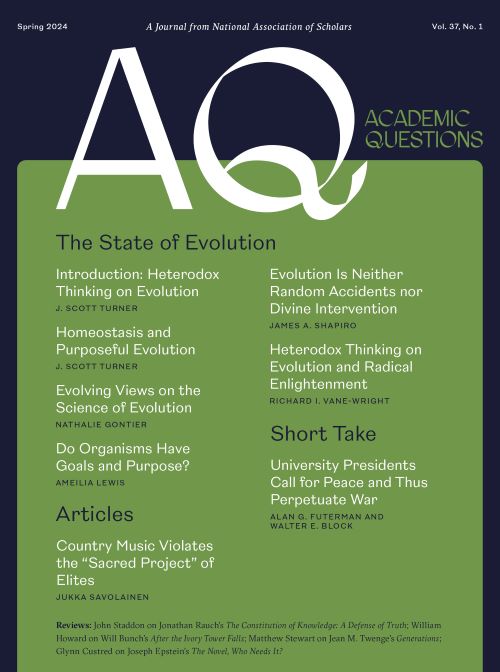The Constitution of Knowledge: A Defense of Truth, Jonathan Rauch, Brookings Institution Press, Kindle edition, 2021, pp. 386, $19.99.
Jonathan Rauch is a gay activist, author, and journalist who has written a well-received book on truth, The Constitution of Knowledge: A Defense of Truth (2021). Favorable reviews of the book abound: the New York Times, the Washington Post, and The Wall Street Journal; Nadine Strossen and Jonathan Haidt like it, and so do Mitch Daniels and Jon Meacham. Does this relatively broad support mean that Rauch has squared the circle; found a version of truth that can unite progressive and conservative views?
Rauch’s interests are chiefly political, rather than epistemological, hence his emphasis on social forces in the establishment of scientific truth: “science is a social network.” He uses the U.S. Constitution as a sort of model for what he calls a “Constitution of Knowledge.” He honors the required tribal signals: “she” is always used as a generic pronoun, even when the topic under discussion is a philosopher king or a collection of medieval aristocrats. And apparently it was a “blind spot” that “[a]ll three of the great liberal social systems . . . in the seventeenth and eighteenth centuries . . . were pioneered by men.” (45-46) But he makes an effort to appear balanced, criticizing intimidation, for example, by trans activists or anyone else.
The book begins with Adam Smith’s insight that, given the right set of rules, bad human instincts, such as greed and ambition, can lead to good outcomes. On the other hand, John Adams is quoted favorably for saying: “Our Constitution is designed only for a moral and religious people.” Apparently “Economic liberalism—market cooperation”—is the secret that reconciles these opposites to produce (Rauch’s examples) “a Prius or iPhone.”
The book is critical of Francis Bacon for excessive emphasis on the experimental method; theory is also important (I was going to write “obviously,” but there have been popular twentieth century scientific movements such as radical behaviorism that abandoned theory—and failed on that account). For Rauch, Bacon’s appeal “lay in his method’s implicit social promise . . . the experimental method suggested a conciliatory path: things people could do to reconcile their disagreements, taking their conflicts off the street and into the lab.”
Rauch gives a nod to C. S. Peirce, anti-individualist founder of the philosophy of pragmatism, for his view of science as an “emergent property of interactions across a social network.” A major virtue of the experimental method, says Rauch, echoing sociologist Joseph Ben-David, is that it allows people to settle disputes peaceably, a political rather than an epistemological justification. “By sticking to empirically verified facts (preferably by controlled experiment),” Rauch argues, “the method enabled its practitioners to feel like members of the same ‘community,’ even in the absence of a commonly accepted theory.”
Of course, for practical or ethical reasons many social questions cannot be tested by experiment.
John Locke is also cited in support of the social view of science: “Locke’s empiricism, then, is a social principle, and he understood it as such. It aims not just at knowledge but also at peace.” Locke also welcomed intellectual diversity (happily he was silent on the other kind). The major virtue of what Rauch calls “fallibilism” is its peace-making quality. He quotes Karl Popper saying that the method “consists in letting our hypotheses die in our stead.” Once again, a prime virtue for Rauch is social harmony.
Rauch sees support for his collectivist view of science in the increase in multiple authorship of scientific papers in recent decades. Unfortunately, this has not been accompanied by a comparable increase in scientific breakthroughs.1 Scientific progress cannot be equated with the number of published papers, as Rauch implies. Scientific creativity is an art. Just as few poems, novels, or paintings have multiple authors, so scientific breakthroughs are usually a product of one or two minds. They are almost never group efforts.
Rauch’s book was written during the Trump presidency, an unfortunate coincidence that has unbalanced more than one writer. Trump is a political not an epistemic figure. But his flexibility with the truth and his incomprehensible (to many intellectuals) appeal to millions of people disturbed Rauch, who calls him “sociopathic.” Trump is a showman; he says what is necessary to get a reaction. Often he is half-serious and self-mocking. The problem for his critics, it has been said, is that they take him literally, but not seriously. His supporters, on the other hand, know not to take everything literally. They share his intent—to make fun of and discredit an establishment—so they don’t really care about the details. For all these reasons, Trump doesn’t belong in a serious book about epistemology. But he is mentioned 160 times.
Rauch has read a lot and cites a lot, which means the book is a bit repetitive. The nub could have been conveyed in half the space.
French sixteenth century essayist Michel de Montaigne is cited for his claim that (again) truth is a social problem, “a problem about reaching, or failing to reach, a working consensus,” as if consensus equals truth. The danger is “affirming the consequent”: to say that truth—scientific truth anyway—usually achieves a consensus, but then to slide into the error that a consensus means truth. (How accurate does Rauch’s account of the medical elite’s 2020 -2021 consensus about COVID-19 look today?).
Rauch quotes Harvard science historian Naomi Oreskes, “A homogeneous community will be hard-pressed to realize which of its assumptions are warranted by evidence and which are not,” which depends what you mean by “homogeneous.” Unfortunately, Oreskes herself is guilty of the “prejudicial beliefs” of which she accuses others, following the loudest majority and ignoring contradictory data about both CO2-induced climate change and the supposed lethality of secondhand tobacco smoke, for example. She famously echoed the consensus medical claim of the harm caused by secondhand tobacco smoke while ignoring critical exculpatory evidence.2 She and her co-author also took the consensus position about CO2-induced climate change despite detailed contrary arguments from distinguished scientists (who she calls “climate deniers”). For example, William Wijngaarden and William Happer in a series of papers make a physical argument to the effect that doubling the earth’s current CO2 level will have a negligible effect on planetary temperature.3 Are they right? Maybe not, but that there exists a contrary consensus doesn’t prove them wrong.
Rauch seems uncertain about the faith that makes science possible: that truth exists independently of our beliefs. On the other hand, he says all the right things: “Anyone who does try to shut down inquiry or debate, or anyone who tries to preordain the outcome of an inquiry or a debate, is by definition removing herself from the knowledge-making business” and:
The fallibilist rule: No one gets the final say. You may claim that a statement is established as knowledge only if it can be debunked, in principle, and only insofar as it withstands attempts to debunk it. That is, you are entitled to claim that a statement is objectively true only insofar as it is both checkable and has stood up to checking.
So why does the book somehow leave this reader feeling that Rauch falls short of what his noble title promises?
First, because he does not distinguish claims that are testable, in a scientific sense, from claims that are not. The claim that the earth is round or that some diseases are caused by bacteria can be tested by observation and experiment. A consensus about such issues is likely to be true. On the other hand, the claim that some sexual practices are unfairly marginalized, that homosexuality is a mental illness, or that abortion is a natural right, for example, cannot be settled scientifically. They must be dealt with through politics. Majority vote may well be important, even decisive, in such a process. But no such simple principle can describe the scientific method.4 On the other hand, science usually arrives at a single answer; political questions, not so much.
Second, Rauch is a bit inconsistent in his consensus argument. In several places he claims that “persons are interchangeable”; in other words, a scientific claim should be verifiable by anyone. In another he claims that consensus relies on an elite:
The reality-based community, then, cannot depend on individuals to know the facts (though it has an easier time if they do), and it certainly cannot depend on them to agree on the facts . . . What it does require is an elite consensus, and preferably also something approaching a public consensus, on the method of establishing facts [emphasis added].
The phrase “elite consensus” is alarming, as is Rauch’s assumption that the public at large is incurably ignorant. And, what elite? What consensus? Who actually defines the “reality-based community”? Rauch would probably reply by claiming that consensus is an “emergent property,” but many will find this unsatisfactory.
Third, for Rauch scientific truth and social justice are on much the same plane. He takes the value of racial diversity for granted, for example: “The system . . . should welcome and exploit human diversity, especially diversity of opinion.” Especially? Why is any other kind of diversity relevant to truth (aren’t individuals interchangeable?). A “woke” agenda is woven into a truth-seeking fabric.
I conclude that Rauch’s book, admirable in so many ways, nevertheless fails to reconcile the irreconcilable: to blend deference to objectivity on the one hand with respect for collective judgment—not to mention same-sex marriage—on the other. As David Hume showed many years ago, the facts of science have no moral valence. There is a good reason that political, moral, and social issues are usually separated from scientific ones. When they are not, science usually suffers. Rauch’s well-intentioned attempt to combine the two areas of knowledge will not improve science and may further muddle an already messy politics.
John Staddon is James B. Duke Professor of Psychology and Professor of Biology emeritus at Duke University; [email protected]. Three of his most recent books are The New Behaviorism: Foundations of behavioral Science, 3rd edition (Psychology Press, 2021), Unlucky Strike: Private Health and the Science Law and Politics of Smoking, 2nd edition, (PsyCrit Press, 2022), and Science in an Age of Unreason (Regnery, 2022). He last appeared in these pages in summer 2023 with “Diverse Identities are Irrelevant to Science.”
1 Daniel Lawler, Juliette Collen, “Rate of scientific breakthroughs slowing over time: Study,” Phys Org, January 4, 2023. It is also probable that the increase in co-authorship is a natural response to career incentives that favor a long publication list.
2 John Staddon, “Science and Activism,” Psychology Today, April 28, 2020.
3 “Van Wijngaarden, William Happer, “Radiative Transfer Paper for Five Greenhouse Gases Explained,” CO2coalition.org, September 6, 2022, https://co2coalition.org/publications/van-wijngaarden-and-happer-radiative-transfer-paper-for-five-greenhouse-gases-explained/
4 See, for example John Staddon, Scientific Method: How Science Works, Fails to Work and Pretends to Work, 2nd edition (Routledge, 2024).
Photo by Cristina Conti on Adobe Stock













